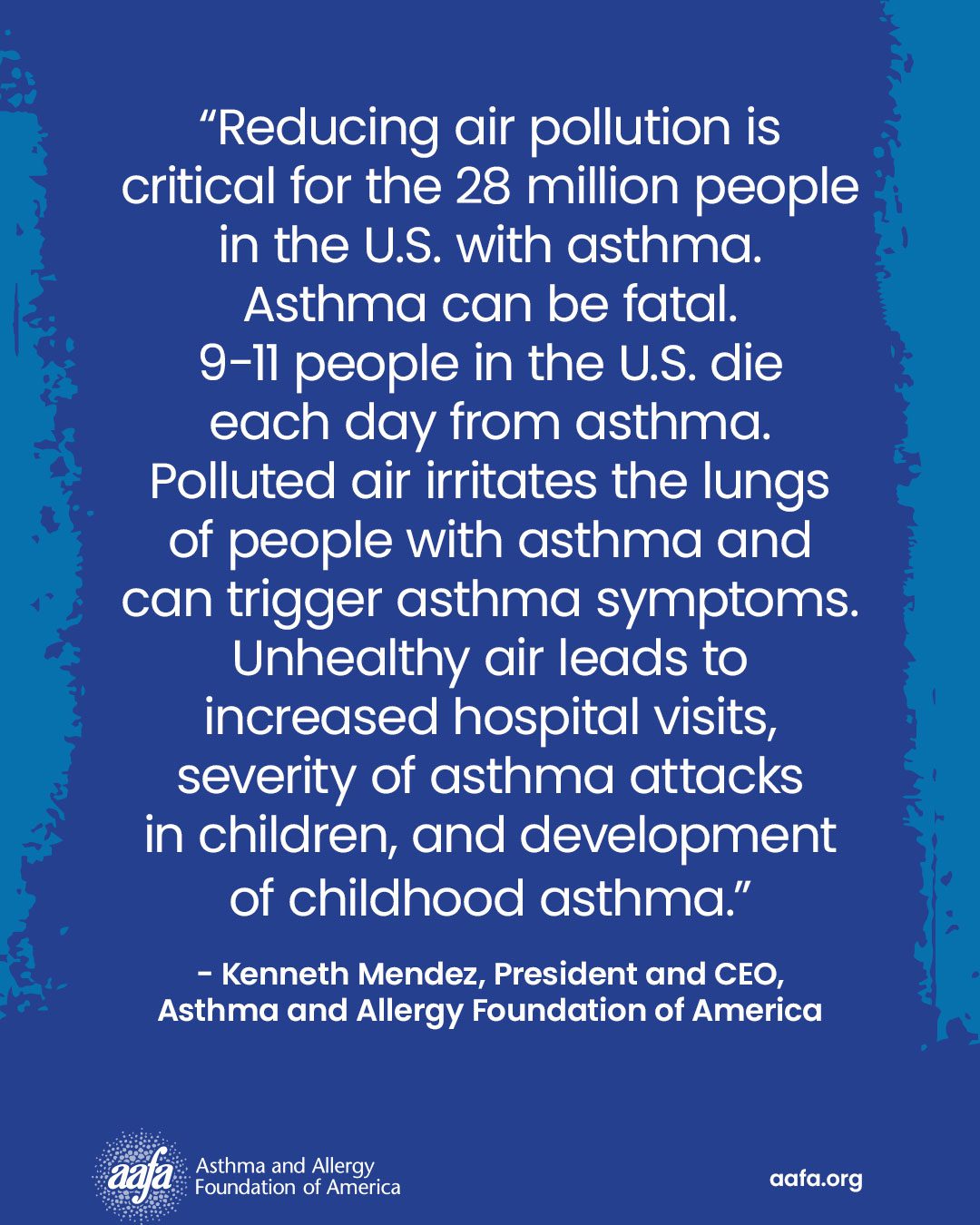News
Reducing Air Pollution Critical for People with Asthma
AAFA issues statement on importance of clean air
Washington, D.C., July 30, 2025 – The Asthma and Allergy Foundation of America (AAFA) issued the following statement on the importance of reducing air pollution and promoting cleaner air.
Kenneth Mendez, President and CEO of AAFA:
“Taking steps to reduce air pollution is critical for the 28 million people in the United States with asthma. Asthma can be fatal. Between 9 and 11 people die each day from asthma in the United States. Polluted air irritates the lungs of people with asthma and can trigger asthma symptoms. Unhealthy air leads to increased hospitalizations, severity of asthma attacks in children, and development of childhood asthma. Studies show that when air pollution is high, there are more emergency room visits from asthma attacks. The EPA’s decision to rescind strict limits on greenhouse gas emissions from cars, power plants and other industrial sources of pollution will lead to more missed days of school and work, more hospitalizations, and more asthma-related deaths.”
Health Impacts of Air Pollution
Breathing in air pollution can cause:
- Breathing problems
- Asthma attacks
- Difficulty breathing deeply
- Worsened asthma symptoms
- Decreased lung growth in kids
- Reduced lung function
- Needing more doses of asthma drugs
- Needing emergency treatment for asthma
- Heart and blood vessel diseases
- Hospital visits
- Adverse birth outcomes (such as preterm birth, low birth weight, stillbirth)
- Early death – estimates indicate 107,000 premature deaths annually in the U.S. directly related to air pollution. Between 3200-4000 people in the U.S. die each year from asthma.
Who Is Most At Risk from Harms of Air Pollution?
The groups most at risk from harmful effects of air pollution include:
- People with lung disease like asthma
- People with heart disease
- Babies and children
- Senior adults
- People who work outside
- People who are active or exercise outdoors
- Individuals who are pregnant and their fetuses
- People who live near sources of pollution (busy roadways, power plants, industrial facilities, oil and gas production sites)
- People who have lower incomes
- Black communities, Hispanic communities, and Native American/Indigenous communities
Economic Impacts of Air Pollution
Air pollution makes asthma symptoms worse and in addition to health impacts, asthma exacerbations carry economic costs. These include:
Asthma is a leading cause of missed days of school, responsible for more than 13 million missed school days a year. When kids miss school due to asthma, this may also mean parents miss work to care for them.
The estimated economic cost – in terms of both health care expenses and time lost at work is $115 billion a year.
Annual medical costs for people with asthma are $3266 higher than for people without asthma.
Outside of asthma, estimates indicate air pollution causes:
$820 billion in healthcare and work-related costs
Decreased productivity due to millions of missed days of work
Decreased agricultural yields – from 5-10% depending on the severity of the pollution and weather conditions

Press Contact:
Andy Spears
Public Affairs Manager
Asthma and Allergy Foundation of America (AAFA)
gro.afaa@aidem
About AAFA
Founded in 1953, AAFA is the oldest and largest non-profit patient organization dedicated to saving lives and reducing the burden of disease for people with asthma, allergies, and related conditions through research, education, advocacy, and support. AAFA offers extensive support for individuals and families affected by asthma and allergic diseases, such as food allergies and atopic dermatitis (eczema). Through its online patient support communities, network of regional chapters, and collaborations with community-based groups, AAFA empowers patients and their families by providing practical, evidence-based information and community programs and services. AAFA is the only asthma and allergy patient advocacy group that is certified to meet the standards of excellence set by the National Health Council. For more information, visit: aafa.org and kidswithfoodallergies.org








